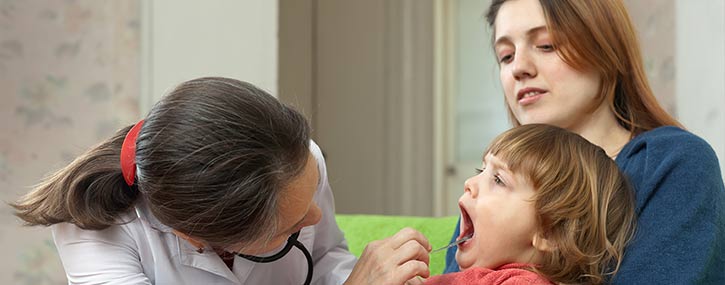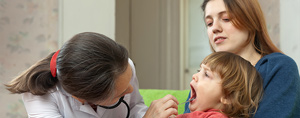Allergy Testing for Children: What Age and What to Expect
Pediatric allergies occur when the child’s immune system reacts abnormally to harmless things such as food, pollen, or dust. Sneezing, coughing, itchy or watery eyes, and skin rashes are just a few of the symptoms that can result from these allergies, which can have a negative impact on a child’s general health and well-being. Pediatric allergists Dr. Jon E. Stahlman, MD, and his staff at The Allergy & Asthma Center work with parents and children to identify the allergens that cause these reactions and provide individualized treatment plans to control the symptoms. If your child is experiencing allergy symptoms, it’s important to get the advice of a pediatric allergist for a thorough diagnosis and effective treatment that will enhance their quality of life. For more information, contact us or schedule an appointment online. We serve patients from Lawrenceville, GA, Atlanta, GA, and Conyers, GA.


Table of Contents:
Is allergy testing painful for children?
What is the best age for allergy testing for children?
When should a child be referred to an allergist?
What can I expect from a pediatric allergy test?
Getting tested for allergies can be helpful if your child experiences rashes or runny noses after eating certain foods. There is no pain associated with allergy tests, but they can still make children (and their parents) anxious.
Your child should be assured that allergy testing won’t hurt and that they will be fine. Tell them testing is necessary to find out what they are allergic to and that it will relieve their symptoms. As a reward afterward, you can take them for a treat to give them something to look forward to.
There are also ways you can make the test easier for them. To help distract them during the test, you can bring a book, a toy, or a tablet. It is especially useful during skin testing as they may experience some itching as they react to allergens.
Your child’s allergist will suggest specific treatments and preventative measures if their results confirm allergies.
There is no age limit to the development of allergies in children. The earlier these allergies are identified, the easier it is to treat them, minimizing symptoms and improving quality of life. It is important to understand that allergy symptoms vary widely. Even though they may be irritating, they are also potentially life-threatening.
There are many things that trigger allergies, including indoor and outdoor irritants, as well as foods. Make an appointment for your child with a pediatrician or allergist if you notice any allergy symptoms in them.
Keep a journal of your symptoms and exposures prior to your appointment. As a result, the doctor will be able to determine whether a pattern exists. The doctor can perform a variety of allergy tests on your child to determine which allergies they have.
Ask your doctor whether allergy testing is appropriate if you notice allergy or cold-like symptoms that don’t go away in a couple of weeks. You should conduct allergy testing for your child if he or she has adverse reactions to certain foods. Your child can be tested at any age, but skin tests are generally not done on children under 6 months of age. In very young children, allergy tests may be less accurate.
Many infants and children suffer from symptoms that raise suspicions that they have an allergic condition. Symptoms of concern may be caused by allergies, and they can be diagnosed by allergy testing. When determining a diagnosis, an allergist can use several methods or combinations of methods. Depending on the severity of the allergy, your allergist will recommend the most effective therapeutic interventions, such as avoidance strategies, diet modification, medication, and allergy shots. Asthmatic children can benefit from allergy testing by better understanding how allergens affect their disease and avoiding specific substances, such as pet dander or dust mites that can worsen symptoms.
It is possible for the allergist to perform a skin test that involves placing certain allergens either on top of or underneath the skin. Generally, three types of tests are available: skin prick tests, intradermal tests, and patch tests. In addition, the allergist may study blood drawn from a vein. Due to the possibility of false-positive results from both tests, allergy diagnoses are usually made only when a child exhibits obvious symptoms.
There are a number of over-the-counter and prescription medications that can interfere with accurate skin tests, such as antihistamines. Your child’s doctor should be informed of all medications he or she is taking before scheduling a test.
Your doctor will advise you on how to avoid triggers if your child has been diagnosed with an allergy. It is also possible to manage symptoms with a variety of medications or treatment options depending on the nature of the allergy.
Allergy symptoms can range from mild to deadly, so it is important for your child to undergo allergy testing. Pediatric allergists are available at the Allergy & Asthma Center. Book your next appointment now! For more information, please contact us or schedule an appointment online. We serve patients from Lawrenceville, GA, Atlanta, GA, Conyers, GA, Suwanee GA, Duluth GA, Grayson GA, Decatur GA, Brookhaven GA, Lithonia GA and Covington GA.

Additional Allergy & Asthma Services
▸ Allergy Shots
▸ Allergy Testing
▸ Asthma
▸ Bronchodilators
▸ Drug Allergy
▸ Food Allergy
▸ Insect Allergy
▸ Nasal/Sinus Allergies
▸ Pediatric Allergy
▸ Pediatric Asthma
▸ Skin Allergy
▸ Spring Allergies




